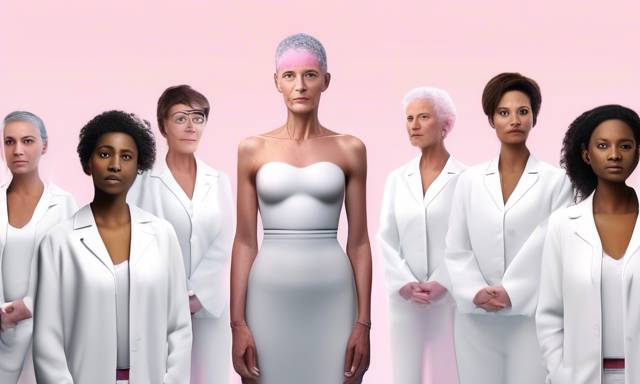Understanding the Gaps in Genetic Awareness for Breast Cancer 🩺
A recent study highlights a crucial gap in knowledge regarding hereditary breast cancer risks among individuals, revealing that many might unknowingly carry genetic mutations linked to this disease. Despite the alarming statistics—one in eight women will face a breast cancer diagnosis in the U.S.—awareness and screening remain alarmingly low. This year, research indicates that significant percentages of those at risk lack proper knowledge of their genetic background, emphasizing the need for improvements in genetic screening and education.
Unveiling the Reality of Genetic Awareness 📊
This study brings to light the significant number of individuals, particularly women, who possess pathogenic variants in the BRCA genes but are unaware of their genetic status. According to findings, approximately 80% of those with such genetic mutations do not know they carry these risks. Joe Jimsky, the director of genomics at Renown Health, who collaborated on this study, explained that the awareness around genetic screening is severely lacking. Many of these individuals do not meet the established criteria for screenings set by current medical practices, a situation that requires urgent attention.
The Importance of Early Detection 🔍
The study explored the implementation of the Healthy Nevada Project, which aimed to enhance the understanding of how genetic screening could benefit the population. Jimsky mentions that in 2018, genetic screening was not widespread, but this project highlighted the need for making such screenings more accessible to everyone. It raises an important point: if 80% of individuals carrying risky genetic markers are unaware, how can we truly address breast cancer’s hereditary aspects?
Challenges in Screening and Awareness ⚠️
This study reveals a dual issue: the need for individuals to advocate for their health and the responsibility of healthcare providers to enhance their screening processes. One significant barrier is the knowledge and comfort level of primary care physicians regarding genetic screening. Many doctors may not fully understand the latest findings in genetics or the urgency of recommending genetic tests to patients, especially in light of family histories of cancer.
The Role of Family Histories in Screening 👪
A more thorough understanding of family history is essential in assessing breast cancer risk. Jimsky pointed out that many patients may not have a detailed family history recorded, which can impact the physician’s ability to make informed decisions about screening. Utilizing simple, straightforward questionnaires can help identify at-risk individuals and help clarify their health risks better than traditional methods.
- Simple questionnaires can simplify the process of documenting family health histories.
- Consistent use of these screening tools can aid primary care doctors in identifying higher-risk patients.
Addressing Disparities in Healthcare Equity ⚖️
Disparities in genetic testing and healthcare access remain significant across various demographics, especially among racial and ethnic communities. The study also emphasizes that the costs associated with genetic testing can be a barrier, as individuals might not pursue testing if they believe it will lead to high out-of-pocket expenses. Collaborative efforts with community health centers aim to provide free testing opportunities, although such strategies cannot be equally applied nationwide.
Need for Improved Education in Medical Training 🎓
To address these challenges effectively, Jimsky called for an overhaul of how medical professionals are educated about genetic screening. He emphasized that medical schools and residency programs should incorporate comprehensive training about family history assessment and genetic testing. It is vital for upcoming healthcare providers to understand the importance of these tools as part of their patient evaluations.
Empowering Patients to Advocate for Their Health 💪
The responsibility doesn’t solely rest on healthcare providers. Patients also need to take an active role in understanding their health risks. They should probe their healthcare providers about their family histories and inquire about genetic screening, particularly if there are known cases of breast cancer or related diseases in their family tree. The focus should always return to being one’s health advocate.
Future Directions: The Ongoing Quest for Knowledge 🔮
Looking beyond current studies, Jimsky expressed intent to continue research into the most effective methods for assessing health risks across populations. The goal is not only to accumulate knowledge but to transform that knowledge into actionable health strategies. Participation in projects like the Healthy Nevada Project will play an essential role in identifying and implementing best practices in screening and patient education.
Hot Take: The Urgency of Genetic Awareness 📈
As understanding about genetic links to breast cancer expands, the necessity for heightened awareness and proactive screening becomes undeniably clear. This year, as this groundbreaking research continues to unfold, it emphasizes that both patients and healthcare providers must collaborate effectively to bridge the knowledge gap. Implementing simple screening methods and increasing awareness of family histories could could dramatically improve early detection and potentially save lives.
The time has come to prioritize genetic health literacy across communities and health systems. Ensuring patients are informed and empowered can make a profound difference in outcomes for hereditary breast cancer.





 By
By
 By
By

 By
By

 By
By